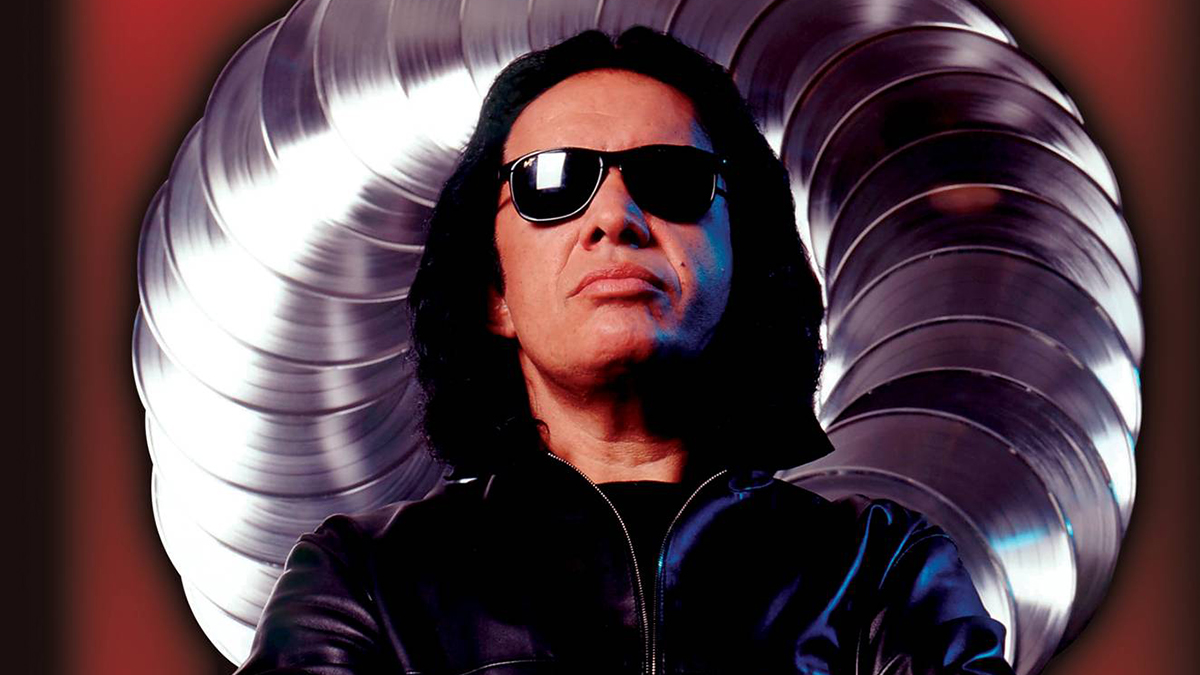Classic interview: KISS' Gene Simmons - “Studio bassists who play with their fingers live have no idea that we can’t hear what they’re playing”
The bass icon on bass rigs, riches and 50 years of music
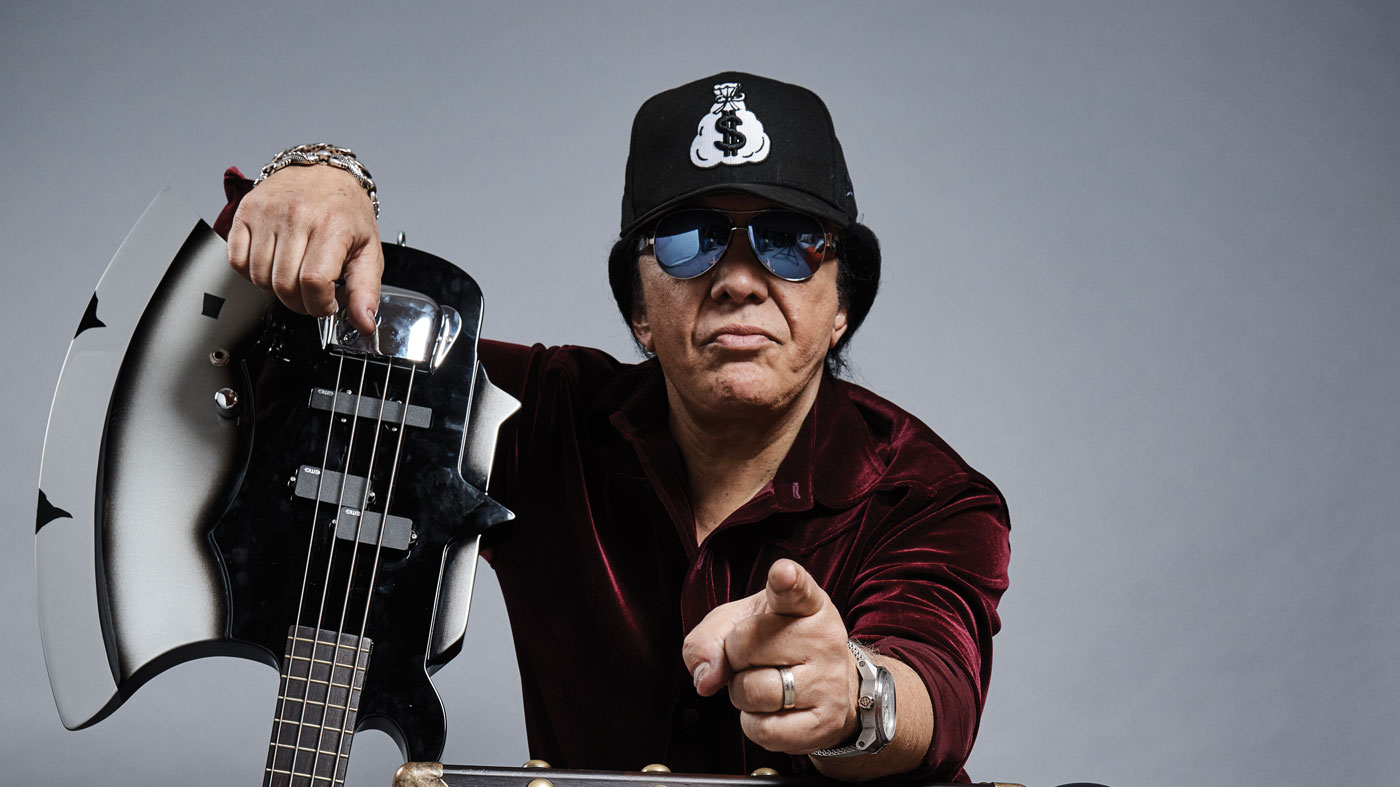
MusicRadar's best of 2018: Fifty years of music; 150 unreleased tracks; never-before-seen photographs... an action figure? What exactly has Gene Simmons been up to this time? We send in top millennial Hywel Davies to find out what $50,000 can get you.
Although he’s spent the last 50 years defining American rock ’n’ roll, and becoming one of the most recognised bass players in the history of popular culture, Gene Simmons of KISS is evidently not ready to hang up his batwings just yet.
Simmons will personally deliver each and every Vault box in person
The 68-year-old Grammy-winner, entrepreneur, author, actor and professional controversialist has recently launched the largest boxset of all time, the Gene Simmons Vault.
A knee-high metal box on wheels which looks like something salvaged from the wreck of the Titanic, the Vault contains Simmons’ musical legacy, containing 10 CDs with 18 hours of unreleased music dating from 1966 to 2016; a 50,000-word book; an ‘In Gene We Trust’ commemorative coin; and an action figure to top it off.
As part of the deal, Simmons will personally deliver each and every Vault in person, depending on which of three packages you buy; these range from $2000 to a $50,000 ‘Home Experience’ package.
The last of these gets you and 25 of your mates two hours of quality time with Simmons at your house, local pub, or other location of your choice, wherever you are in the world. You can also bundle it with one of Simmons’ signature basses, the Axe or Punisher.
The God Of Thunder is in a good mood when he meets us at the bar of London’s Soho Hotel, giving us a cheery fist-bump and proving unstoppable on the subject of his latest venture, plus an insight into those famous bass guitars.
Want all the hottest music and gear news, reviews, deals, features and more, direct to your inbox? Sign up here.
As the two of us munch on a couple of bowls of peanuts, requested by the man himself, we exchange some alpha male-style banter before getting down to the subject at hand.
Gene Simmons, the legend! Do you like to be called ‘Lord And Redeemer’ or just ‘Gene’?
“[pulls out phone] Siri, what do you call me? [phone app states: ‘You are my Lord and Redeemer’]”
Nice one. So, tell us about the Vault. This is your legacy, isn’t it?
“The whole idea of ‘legacy’ does not appeal to me at all. Imagine you’re lucky enough to reach the heights of Mount Olympus and you have enough money to throw a party; why would you throw a party and be the only one in it? I don’t like the idea that after somebody’s dead, you release these tracks. Fuck that! I want to be here to enjoy it.
“I really don’t understand the appeal of climbing Mount Olympus and being up there by yourself. You want to bring everybody else up there with you so you can say, ‘Wow, isn’t all this cool? I’m such a lucky bastard. Look at all that!’, because you want them to enjoy it with you.
“Without people, there’s no value to anything. The idea of money or power or position or beauty or being a champion means nothing if you’re by yourself. The idea of being dead and gone means very little to me. Whatever I want to do, I want to do it while I’m alive.”
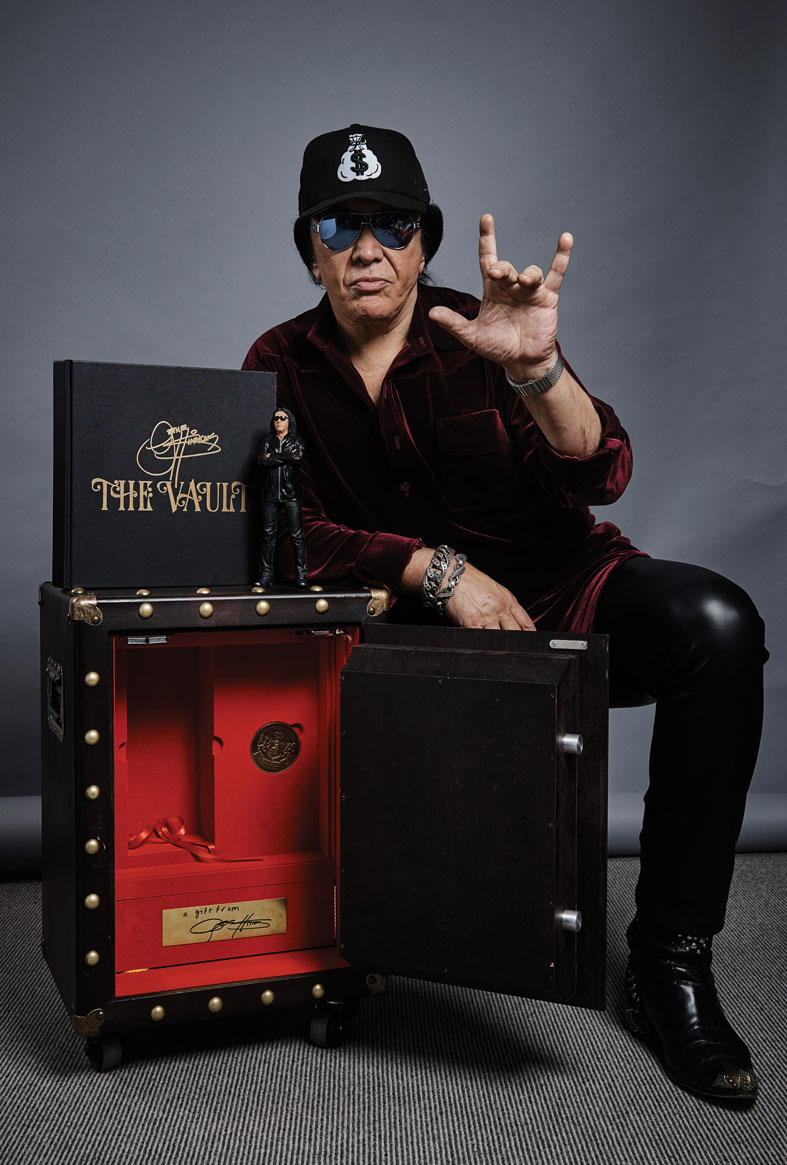
What's in the box
So what’s in the Vault?
“It’s the largest box set of all time. It is literally 150 tracks, never before been released, spanning 50 years from 1966 to 2016. This is more than anybody has ever done. It includes three songs I wrote with Bob Dylan 18 years ago, and songs with Van Halen, who I discovered back in the 70s and who were kind enough to do three tracks with me.
“It’s got all the KISS guys on it. Some of the tracks go all the way up to 2016. The oldest track is from 1966. I will hand-deliver this around the world [holds out his hand]. Notice that at 68, my hand does not shake. It’s called no drugs, no booze, no alcohol and no cigarettes. You watching me?”
There are individualised presents in there, too - different ones every time. They’re taken from my collection, and it could be anything
That’s the sturdiest hand I’ve seen in a while, Gene.
“So, what I’m going to do, because I’m a rich son of a bitch, is I’m going to incur the cost, no charge. I’m going to incur the cost of the flights, hotels, security, insurance: I’m going to do all of that.
“And yes, if you’re in Sheffield and you buy one of these babies, I will fly to London, and you and your friends are going to have yourselves a [cockney accent] ‘propah time’. I’m going to hand-deliver this right into your sweaty little paws. Then if I have an acoustic guitar in my hands, I might play a few songs, tell a few stories and stuff. As you can see, the Vault is built to the highest quality.”
It’s gorgeous.
“There are individualised presents in there, too - different ones every time. They’re taken from my collection, and it could be anything, it could be from when I’ve been on stage, it could be boot coverings I used on stage, anything.”
I heard there’s a special package including one of your Axe or Punisher basses.
“You can get a Gene Simmons Axe or Punisher signed; they go from $5,000 to $15,000. The box set goes for $2,000. Want to buy them together? $6,000.”
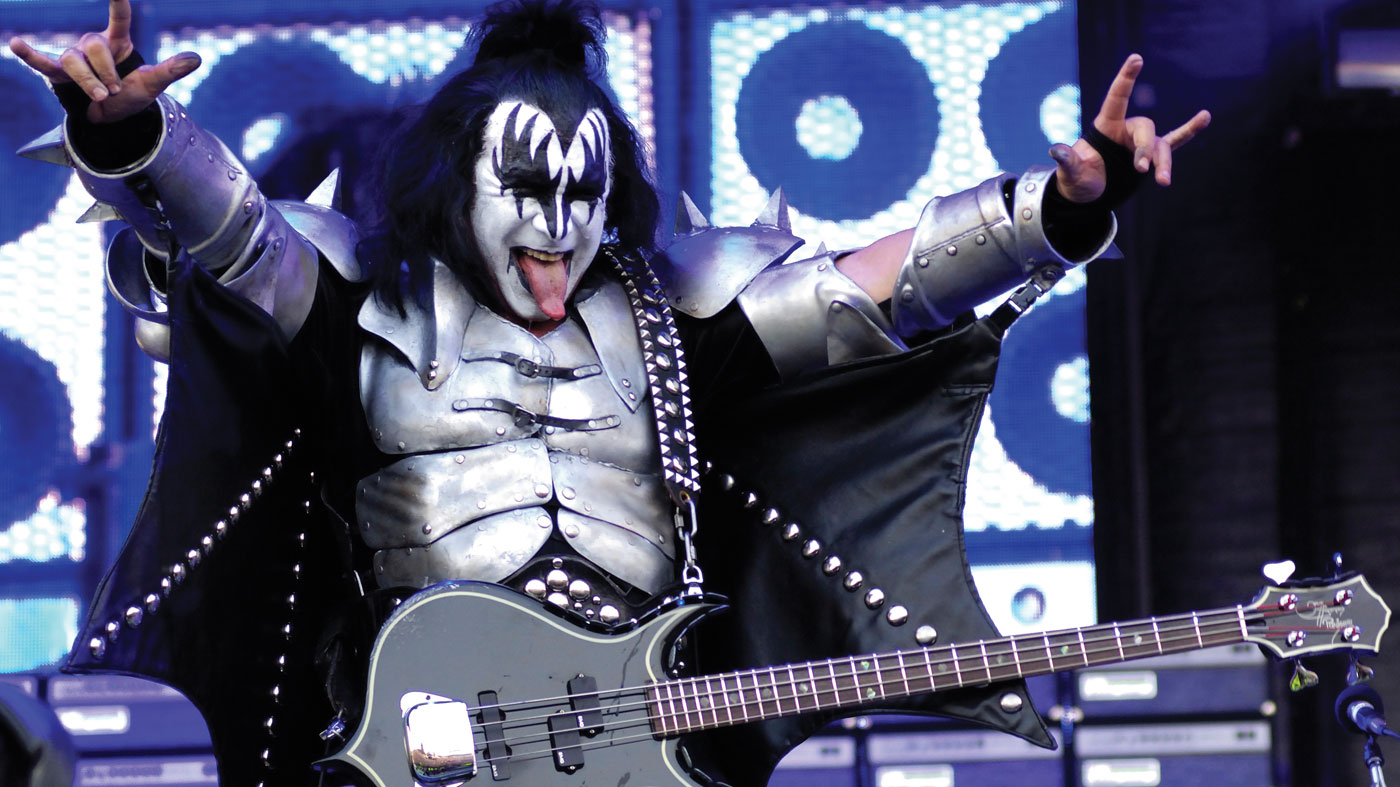
The price is right
So what can a fiver get me?
“Nothing. A Rolls-Royce is full price or nothing. There’s only going to be a few thousand ever made, and after that, they’re all gone. If you want me to spend the whole day with you, spend $50k. Invite your friends. We can go to the pub, we can do anything you want. But if you want me to go there without the buck, I’m not going, because I get $100,000 to $500,000 to do speeches and public appearances. I really want to emphasise, I want to be there with the fans, meet the kids who were named after our songs. Put in that last ride. I’m 68, how long am I going to do this?”
I want to be there with the fans, meet the kids who were named after our songs
Out of the 150 tracks that are on there, which one is the most important to you?
“Wow! [pauses for a good minute] What’s probably the most important song is the very first one that I ever recorded back in 1966. That first kiss, you’ll always remember that; you’ll always remember your first one. I remember I was in the basement and I had just learned how to play guitar [mimics playing chords] A, G, D, C, A minor, D minor. ‘My uncle is a raft that keeps me floating...’ ‘Hey, let’s go down and record that.’”
Tell us about working with Bob Dylan.
“I picked up the phone and I called his management. I said, ‘What have I got to lose?’ I’m like that with anything. Bob picks up the phone, ‘Hey Gene, how you doing?’, ‘Oh hi Bob!’ Within two days, he’s up at the house. He comes up in an unmarked van and gets out with an acoustic guitar. I’m in shorts, because it’s a very hot day in California, and we start playing stuff. I’ve got the actual recording of us playing live and writing the songs. Three songs came out.”
This thing will be passed down from generation to generation.
“Exactly, and that’s what I wanted. None of this cloud storage, popcorn farts, disposable nothing.”
Who actually makes the Vault?
“Different people make different things. Originally we were going to do it through a safe company, but they were just too expensive, so we decided to make it piecemeal. The wheels are bought from a separate company, for example. Those are metal wheels - full metal, not even aluminium - because this thing is meant to last. It took us about a year to put together.
“The dial on the front is real, like a real safe, but we decided at the last minute not to have individual combinations. How many times did you forget your password and all that torture? You’re going to have to break into it. We were like, ‘Fuck that, let’s not do it.’”
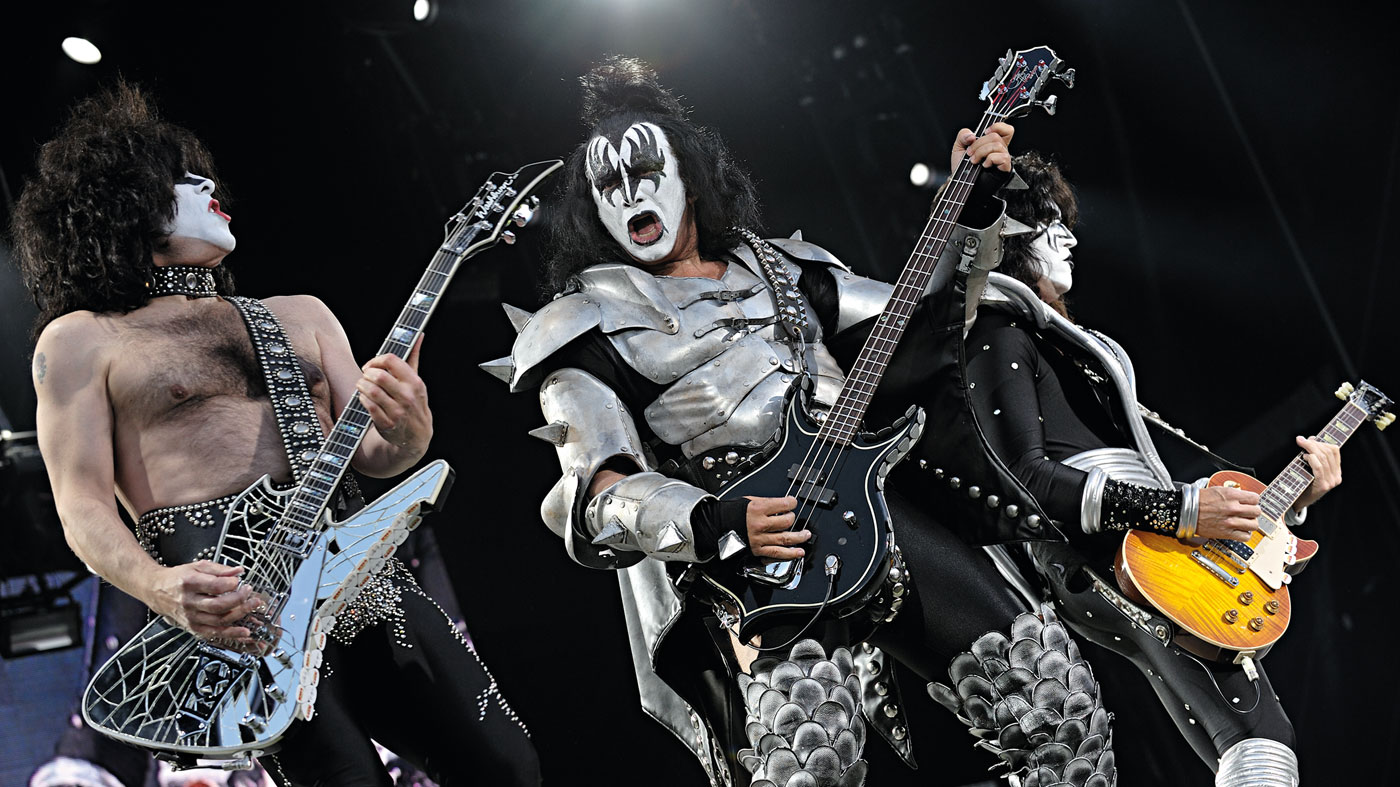
Analogue man
It’s the opposite of modern digital culture.
“Record companies are broken. I’ve had a few myself, but with everybody downloading and file sharing, I won’t have any part of it. It’s only going to get fixed when governments start issuing new legislation, but they’re far behind. Technology has far overtaken us.
New bands don’t have the chances that we did. They’ll have to earn a living some other way, and do music and touring as a hobby
“New bands, and this breaks my heart, don’t have the chances that we did. They’ll have to earn a living some other way, and do music and touring as a hobby. That’s going to kill the next Elvis and the next Beatles. They’re out there, but they won’t be able to make it - not a chance. It won’t change for 10 years.”
And exposure only gets you so far.
“That means nothing. How about no exposure and just pay me? My daughter [Sophie Simmons] had a single with 10 million views on Casablanca Records called Kiss Me, which I had nothing to do with. It got 10 million views; she made only $214. It was one 10,000th of a penny for every download.”
Does that include Spotify?
“No idea. Spotify, Schmotify! It all means nothing.”
Won’t delivering the Vaults in person hit you hard? I mean, plane tickets are not cheap.
“[whispers] I’m rich. It’s relative, though. You wander the streets as a kid and you find a quid on the floor, and you’re shocked. Then, when you’re a few years older, you find a £10 note. Then you win the lottery, you win £10,000! Wow! But it’s all relative. So, what is the amount that makes you rich?”
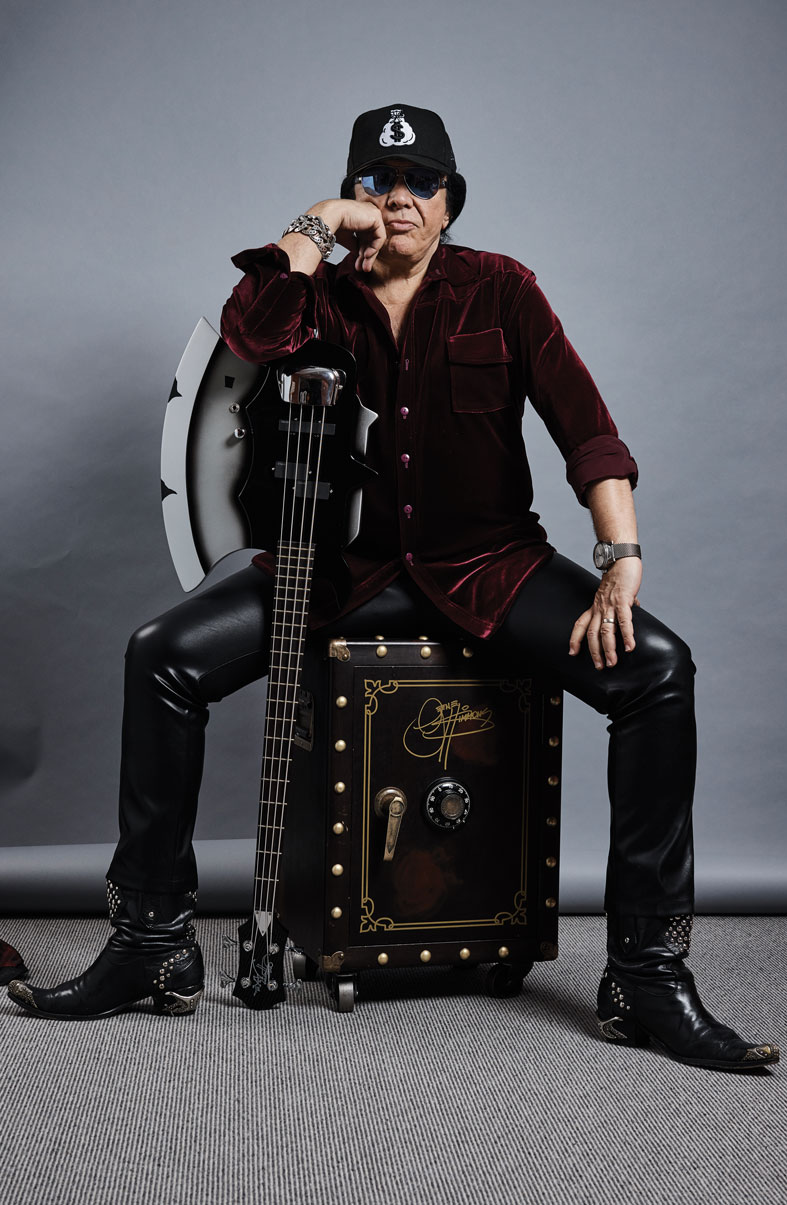
Money money money
A wise man once said, ‘Money doesn’t make you rich’.
“Well, that’s a fool, and I’ll tell you why. If your mother needs a hip operation, or your family needs food and shelter, only money will get you that. The Ethiopian mother in the Kalahari desert who holds her baby has all the love in the world, but that baby will die.
“You need money to buy protection and food. Money actually profoundly and accurately makes you happy. I’ve never seen anyone on TV or in print who won the lottery, who won two million pounds, who was sad.”
If you’re a miserable son of a bitch, it’s still better to be a rich miserable son of a bitch than a poor one
But does money make people happy?
“Yes it does. I’ll say this; if you’re a miserable son of a bitch, it’s still better to be a rich miserable son of a bitch than a poor one. There’s just no arguing with that. Money is the root of all happiness, from the food that you buy to feed your children, to the money you give to charity, and to the jobs you create.
“It’s in the language: the word ‘poor’, meaning not having money, is synonymous with doing badly. ‘How’s that food?’ ‘Oh, it’s rich.’ ‘How did he do in school?’ ‘Oh, he did poorly.’ People are misguided - I don’t want to say they’re fools - they’re misguided, and they say things like, ‘Oh, I just want enough to get by.’ I invite all those people to send me all the pounds they don’t need. You think you’ve got too much? Send everything you don’t want to me. Just trying to help out.”
Let’s talk about your Axe basses.
“So first, it’s a through-body design. There’s no bolt-on, none of that bolt stuff, because as we both know, over time, moisture will warp that neck.
“The other thing is that it’s Australian wood. There’s something about that particular wood, because we haven’t polluted the soil. Over here there’s generations and generations of soil, and because you grow stuff on it, there’s less and less minerals in the soil, so the trees are less porous. When you go into the forests of northern California where they aren’t farmed or anything, those trees grow to be a thousand feet tall, or however tall they are. What are they called?”
Redwoods.
“Yeah, and they’re so thick you can drive through them. You want to try doing that here? It’s not going to work because the minerals in the soil have been depleted over a thousand years of farming the same soil. So, we’re using Australian wood, which is much more expensive.”
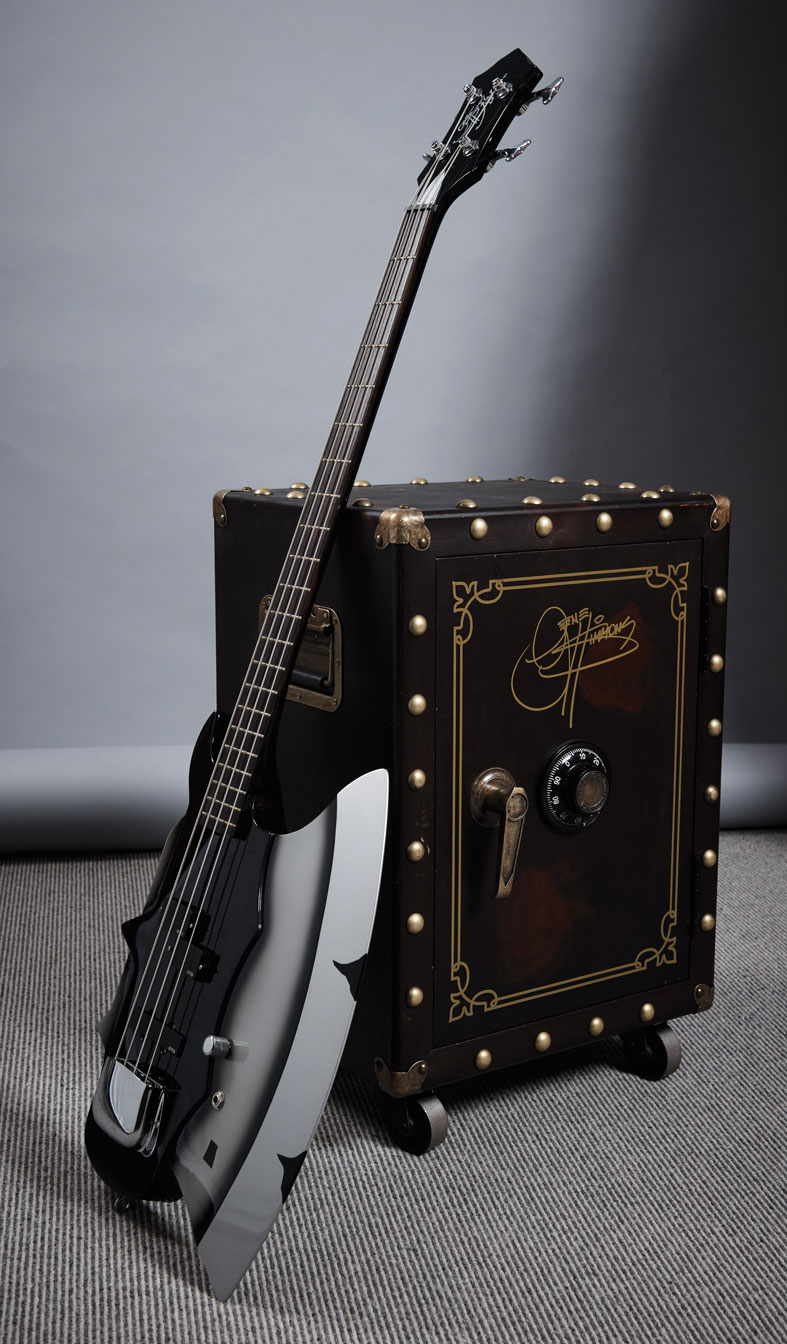
Shape of bass to come
How did you come up with the body shapes?
“Well, I don’t like Fender basses, because when you want to play a lick high up the neck, you’ve got quite a number of frets that are right in the body. You have to be like Jeff Beck and [impersonates double tapping] tap with your fingers. I want the neck as fully exposed as I can without giving away the strength of the neck or the balance. The neck is as exposed as I can do it without harming the guitar. It took forever.”
The best tool you have is a mixer that understands your sound, and he’s going to try and get there
On your live basses, the tone dial is missing; it has a bit of tape over it. You also move the jack over. Why is that?
“Live, it is a delusional point of view that the players have of all those dials on their guitars. You have all those dials left, right and centre; treble up, down, different pickups and all of that. Those are the variables. Then you plug into an amp and it changes your sound. Also, if you have a preamp of some kind that’s going to change your sound. Then you go through speakers or you go direct. That goes to the mixer, which does its thing. By the time your playing goes through the sound system, you’re on crack if you think you’re controlling the sound. You’re not.”
So what’s the solution?
“The best hope you have is to get the sound you like live, and don’t worry about anything else because you’re at the mercy of the sound mixer. The best tool you have is a mixer that understands your sound, and he’s going to try and get there. All these other different frequencies are flying all over the place, with the highs competing against all those lows, so you’ve got to fit in somehow into this framework that’s coming out of this sound system.”
What are your views on the pick versus fingerstyle question?
“Respectfully, studio musicians who play with their fingers live have no idea that we can’t hear what they’re playing, because there’s no actual definition on the note that’s coming out. You can do that and love it and have no fuckin’ idea what he’s playing, but you love that low end, or you can be like Chris Squire and have a very bright sound, where you can hear the attack and therefore hear the note that’s actually being played. I mean, a piano is a percussive instrument, and you can hear every single note because there’s a definition when the player hits the note.”
A lot of bass players don’t use amps live. Is that the case for you?
“No, I like the amp sound. Up to a hundred feet in front of me, people hear less of me in the overall sound and more of my stage sound. I want them to hear the cool sounds.”
Well, thank you Gene. Things seem to be going rather well for you.
“I can’t complain - and if I did nobody would give a fuck. Oh, I’m sorry. I meant, nobody would give a poop! It’s what’s politically correct.”
The Vault is available to order now.


